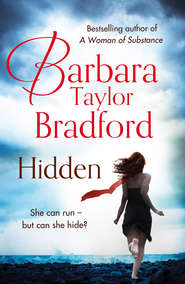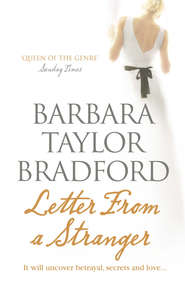По всем вопросам обращайтесь на: info@litportal.ru
(©) 2003-2025.
✖
Angel
Автор
Год написания книги
2018
Настройки чтения
Размер шрифта
Высота строк
Поля
The two last stops on her list were Gap and Banana Republic, not far from each other on Lexington. These were the best shops in which to pick up T-shirts and jeans for Collie and Yvonne, who so much admired hers. She generally donned these typically American clothes at weekends; in actuality, they had become something of a uniform for her, worn with the mandatory white wool socks and highly-polished brown penny loafers, and Collie and Yvonne both wanted to emulate this look. Since she wouldn’t have time to go shopping when she returned to Paris, she had decided to take a supply back with her. Also, the jeans and T-shirts could be gift-wrapped to go under the big Christmas tree which they would put up in the stone hall at Montfleurie.
FIVE
Nothing much had changed in the apartment since she had last been here two years ago, Rosie noticed, as she wandered aimlessly around later that afternoon, waiting for Kevin to call. In fact, it was very much the same as it had always been.
Rosie had first come to this apartment in 1977. She and Nell had met in the spring of that year, and they had taken to each other at once, each, perhaps, recognizing the maverick in the other, and not long after their first meeting she had been invited to Sunday lunch by her new friend.
The instant she had stepped inside the large, somewhat rambling apartment on Park Avenue she had felt at home, and, with her discerning eye, she had recognized that whoever had decorated the place was knowledgeable about antiques, and had considerable decorating expertise, not to mention superlative taste.
The expert turned out to be Nell’s Aunt Phyllis, her father’s sister, who had lived with them since Nell was ten, which was when her mother Helen Treadles Jeffrey had died of a brain tumour. In August 1976, when Adam Jeffrey, Nell’s father, had been appointed chief American correspondent for his newspaper, the London Morning News, and transferred, his sister had rushed over to New York with him. She had found the apartment relatively quickly, and begun decorating it without wasting a single moment of her time. When Nell finally arrived that Christmas, having left her English boarding school for good, the apartment had already been turned into a replica of the gracious flat they had just vacated in London.
On that first visit, Nell had explained to Rosie that most of the lovely English and French antiques she was so busy admiring had been shipped over from their Chelsea home. Nell had added that Aunt Phyllis had zeroed in on some of the top New York fabric and wallpaper houses, had selected only the most handsome wallcoverings, and the finest French silks, English chintzes and brocades in order to create the look for which she was well known in London, where she enjoyed great success as an interior designer.
Suddenly, in 1979, when he was only fifty-two years old, Adam Jeffrey dropped dead of a heart attack. Nell and her aunt had remained in New York, where the latter had already established herself as a decorator of some distinction, and acquired a roster of notable, wealthy clients. It was not until Nell was twenty-three that her Aunt Phyllis finally decided to return to London permanently, leaving her niece behind in New York.
By this time Nell had a good job, most of her friends were in the city, and, not unnaturally, she had no desire to leave Manhattan, where she had lived for six years, and where she was perfectly happy and content. Nell’s father had left her the Park Avenue apartment in his will, and she had continued to live in it, had changed very little of the decor over the years, loving it exactly the way it was.
To Rosie, one of the prettiest and cosiest rooms in the apartment was the small library, charmingly decorated all those years ago by Aunt Phyllis. It had striated, apricot-coloured walls, a lime-green-and-black needlepoint carpet, a colourful floral chintz used for balloon shades at the windows and to cover a sofa, and a collection of mellow English antiques. One long wall of white-painted shelves held books intermingled with English Staffordshire animal figures; current magazines and the day’s newspapers were arranged on several small tables.
And so it was to this room that Rosie gravitated with her cup of tea around five o’clock, where she turned on the radio and sat down on the sofa to relax with the New York Times. Once she had finished reading the newspaper and drinking her tea, she leaned back, closed her eyes and drifted with her thoughts, praying that Kevin would call today. When she had returned earlier from her shopping expedition, the first thing she had done was check Nell’s answering machine. There were no messages on it at all, much to her disappointment.
Lulled by the soft music on the radio, Rosie dozed off after a while. But some twenty minutes or so later she awakened suddenly, feeling oddly disoriented, and she sat up with a jerk, wondering where she was, completely at a loss, and it took her a few seconds to realize that she was at Nell’s in New York.
Shaking herself awake and rising, Rosie carried the cup and saucer into the kitchen, where she rinsed and dried both, and then put them back in the cupboard.
She stood in the centre of the large blue-and-white kitchen, hesitating for a moment, and then she went to the refrigerator and looked inside, wondering what Maria had left prepared for her. She found a delicious-looking veal casserole with vegetables in a covered glass dish, and there was also a cold roast chicken, as well as a selection of cold cuts, various salads, a cake, and assorted cheeses on the next shelf. Obviously Maria, who had the weekend off, was determined that she would not starve in her absence. It struck Rosie that if she did not hear from her brother she would not fare so badly here; she could at least have a light supper and watch television.
By six-thirty, Rosie was beginning to feel more worried than ever that there had been no word from Kevin, and just as she was on the point of calling him one more time the phone began to ring. She lifted the receiver, hoping to hear his voice, and much to her relief she did.
‘Sorry, Rosie, but I couldn’t get back to you before now,’ he explained, after greeting her affectionately. ‘I’ve been unavailable all week. Business. I only just got your many messages, honey.’
‘I understand, Kevin,’ she said quickly, so happy to talk to him she instantly forgot about her anxiety and frustration of earlier. ‘I hope I’m going to see you. Is your…business finished?’
He hesitated, but only for the barest fraction of a second, before saying, ‘Sort of… Well, yes, I guess it is, and I’d love to see you too. I can’t wait, in fact.’
‘So when can we get together, Kev?’
‘Tonight? Are you free?’
‘Of course I am! Where shall we meet? Or do you want to come over here?’
‘No, let’s go out. What about meeting at Jimmy’s? How does that sound to you?’
‘Like old times!’ she exclaimed, laughing.
He chuckled into the phone. ‘Is seven-thirty too soon for you, honey?’
‘No, not at all. I’ll see you in an hour at Neary’s.’ Hanging up the phone, she raced into the bedroom to refresh her make-up and do her hair. Like Gavin, her brother would start chastising her if she looked tired or out of sorts, and this she wanted to avoid.
SIX
Kevin Madigan stood leaning with his back against the bar at Jimmy Neary’s Irish pub on East Fifty-seventh Street, his eyes focused on the door.
And so Rosie saw him the moment she walked in, saw the wide grin spreading across his handsome Irish face when she raised her hand in greeting.
She flew into his arms and they held each other tightly, hugging. They had been close from childhood, Kevin forever her protector, she his sage adviser, even when she was a little girl, always telling him what to do and explaining why he should do it. They had drawn even closer after their mother’s untimely death, taking comfort from each other’s presence, feeling more secure, safer, when they were in close proximity.
Kevin had gone to London – as Gavin’s guest – at the start of principal photography on Kingmaker, and they had seen a lot of each other during the week he was there. But that had been six months ago and they both suddenly realized how much they had missed each other.
Finally they stood apart, and Kevin looked down into her upturned face. ‘You’re a sight for sore eyes, mavourneen.’
‘So are you, Kevin.’
‘What would you like to drink?’
‘A vodka tonic, please,’ she answered and took hold of his arm, lovingly smiling up into his happy face. Her relief that he was safe and well so overwhelmed her it knew no bounds. She worried about her brother constantly; she supposed she always would, no matter what. He was her flesh and blood, after all.
They stood at the bar, sipping their drinks and catching up, so happy to be in each other’s company the time just flew by. Eventually, Jimmy Neary himself came over to say hello to Rosie, whom he had not seen for several years, and after a minute or two of genial conversation he led them to Kevin’s favourite table, situated at the back of the dining room.
Once they were settled and had ordered dinner, Rosie looked at Kevin across the table, fixed her eyes on him intently, and murmured, ‘I wish you’d give it up.’
‘Give what up?’ he asked, breaking his roll in half, spreading butter on it.
‘Being a cop.’
Kevin stared at her, his eyes widening in surprise, incredulity registering. ‘I never thought I’d hear you say a thing like that, Rosalind Mary Frances Madigan. All the Madigan men have been with the New York Police Department.’
‘And some of them died because of it,’ she pointed out quietly, ‘including our Dad.’
‘I know, I know, but I’m fourth-generation Irish, fourth-generation cop, and there’s no way I can give it up, Rosie. I wouldn’t know what else to do. I guess you could say that for me it’s bred in the bone.’
‘Oh Kevin, I don’t think I explained myself very well! I didn’t mean you should quit the force – I just wish you’d stop working undercover. It’s so dangerous.’
‘Life is dangerous, and in a lot of different ways, honey. I could get killed crossing the street, taking a plane trip, driving a car. I could choke on my food, get a fatal disease, or drop dead from a heart attack…’ He left his sentence unfinished, gave her a long hard stare, and then shrugged his broad shoulders almost nonchalantly. ‘People other than undercover cops die every day, Rosie. Especially these days, what with kids toting guns and stray bullets flying around everywhere. I know you love this city, and so do I in my own way, but it’s gone to hell on crack and smack and random violence, to name only a few of its ills. But that’s another story, I guess.’
‘I don’t want you to get killed the way Dad did,’ she persisted.
‘I know…Funny about Dad, when you think about it. He was just a plain old garden variety detective, doing a standard job at the Seventeenth, minding his own business so to speak, and he went and got himself killed, and at that by accident –’
‘By the Mafia you mean,’ she cut in.
‘Ssssh, keep your voice down,’ Kevin said swiftly, warily glancing around, while knowing full well there was no real reason to do so. After all, this was a well-known and respectable mid-town establishment on the East Side, just off First Avenue and a stone’s throw away from posh Sutton Place. Still, he couldn’t help himself. Being cautious was a habit he had honed to astonishing perfection over the thirteen years he had been with the police; that was the reason he only ever sat with his back to the wall, facing the door, when he was in a public place. He could not afford to be taken by surprise from behind, not ever, not in his job.
Leaning forward, bending over the candle in its red glass container, bringing his head closer to hers, Kevin went on, ‘Supposedly Dad was taken out by the Mafia, but there’s never been any real proof, and I’ve never been absolutely sure of that myself. Nobody has, not even Jerry Shaw, his partner. And let’s face it, the Mafiosi don’t make a habit of shooting cops, for Christ’s sake; it’s kinda bad for their business, if you get my drift. Look, they much prefer to neutralize cops, you know, get them on the pad – on the take. Wiseguys feel easier dispensing cash not coffins.’
‘I suppose you’re right,’ she agreed reluctantly. ‘A dishonest detective is more valuable to them than a dead one…that spells trouble.’
‘You betcha it does.’











